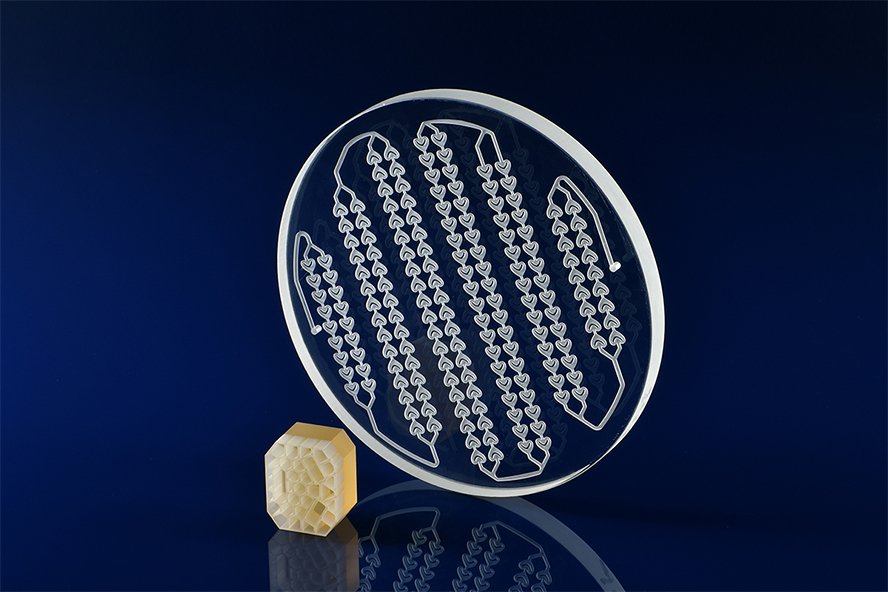Ultra-Low Expansion ULE Glass produced by Corning has a lower CTE coefficient than Schott’s Zerodur glass, and does not require crystallization. It is also very good at adapting to temperature changes, avoiding deformation or stress caused by thermal expansion and contraction, and ensuring stability in high-precision applications (laser resonant cavity, astronomical telescope, atomic clock resonant cavity).

ULE Glass Advantages
🔹Excellent dimensional stability
🔹Able to adapt to extreme environments
🔹Flexible size and shape changes
🔹Very low internal stress
🔹Excellent optical uniformity
🔹Like ZERODUR, it has a thermal expansion coefficient close to 0
ULE Glass Application
🔹Astronomical optical mirror
🔹Lithography machine radiation mirror
🔹Laser interferometer cavity
🔹Laser rangefinder components
🔹Space telescope components
🔹Atomic clock resonator
🔹Ultra-stable laser system
Material Properties
| Material Properties | Unit | ULE |
| Density | g/cm³ | 2.21 |
| Poisson’s Ratio | 0.17 | |
| Shear Modulus | GPa | 29 |
| Bulk Modulus | GPa | 34.1 |
| Elastic Modulus | GPa | 67.6 |
| Specific Stiffness, E/ρ | m | 3.12 × 10⁶ |
| Ultimate Tensile Stress, MOR | MPa | 49.8 |
| Knoop Hardness, 200g load | kg/mm² | 460 |
| Thermal Properties | ||
| Strain Point | °C | 890 |
| Annealing Point | °C | 1000 |
| Softening Point, estimated | °C | 1490 |
| Mean Specific Heat, Cp | J/(kg·°C) | 767 |
| Thermal Diffusivity, D | cm²/s | 0.0079 |
| Thermal Conductivity, K | W/(m·°C) | 1.31 |
| D.C. Volume Resistivity, 200°C 100Hz (R) | ohm·cm | 10¹⁶ |
| Mean Linear Coefficient ofThermal Expansion 5°C to 35°C(a) | 10⁻⁷/K | 0 ± 30 |
Chemical Durability
Excellent resistance to weathering
Exhibits virtually no surface clouding or electrical surface leakage when subjected to attack by water, sulfur dioxide, and other atmospheric gases.
High resistance to attack by nearly all chemical agents.
ULE Glass Manufacturer
Jundro is a high-quality technical ceramic machining manufacturer, specializing in providing excellent services by utilizing technical expertise and advanced equipment. We offer customized machining of various high-precision ceramic parts, including irregular shapes, round shapes, and curved surfaces, with the capability of 5-axis precision machining.
If you need to choose ULE glass for your project, please contact our experts and we will provide strong support for your project.
FAQ
How is ULE Glass composed?
ULE (Ultra-Low Expansion) glass is a special glass composed of silicon dioxide (SiO₂) and a small amount of titanium dioxide (TiO₂). Its core feature is its extremely low coefficient of thermal expansion (CTE≈±3×10⁻⁸/°C). It is almost unaffected by temperature changes near room temperature and can maintain extremely high dimensional stability, making it suitable for scenes requiring nano-level precision.
Limitations of ULE Glass
High material cost and complex processing technology.
Requires precise support structure to achieve maximum performance.
Low tolerance to mechanical shock, requiring additional protection design
What is the difference between ULE glass and regular glass or glass-ceramic (such as Zerodur)?
Ordinary glass: high thermal expansion coefficient (about 9×10⁻⁶/°C), easily deformed by temperature changes.
Zerodur glass-ceramic: requires crystallization, CTE≈0.05×10⁻⁶/°C, but may produce internal stress due to crystallization.
ULE glass: no crystallization process is required, CTE is lower (close to zero expansion), and the material homogeneity is better, suitable for ultra-precision optical systems.
